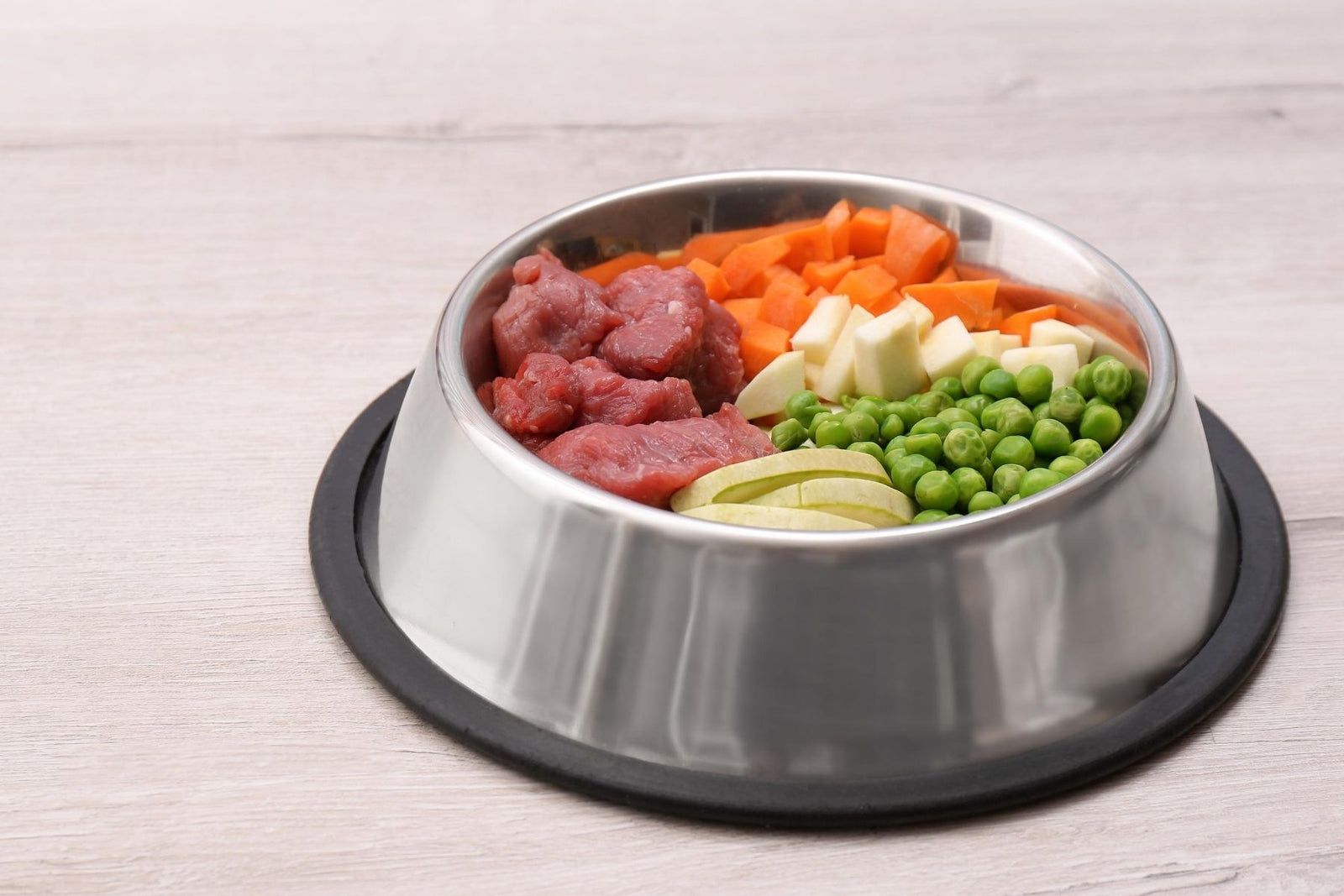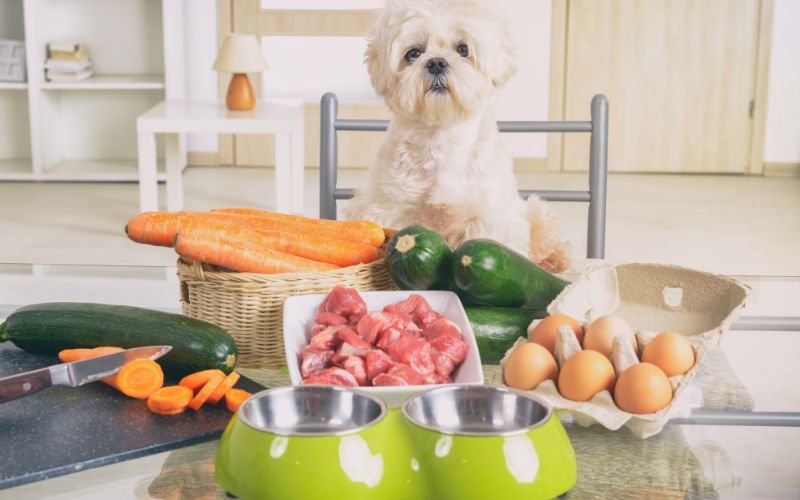When it comes to feeding your dog, there’s a whole range of diets to choose from.
From commercial kibble to raw diets and homemade dog food, making the right decision can often feel overwhelming, especially as trends change over time.
After all, you want to ensure your dog is receiving healthy food that nourishes their mind, body and soul, but you may worry about getting it right.
In more recent times, we have seen a shift in the foods that dog owners are choosing to feed their canine companions.
In fact, a 2018 international study on pet feeding practices revealed that the popularity of commercial pet food is declining, in favour of raw and homemade diets. Over half of the animals represented in the study were at least part-fed a raw or homemade diet.

At Wellbeing For Dogs, we are big fans of homemade dog food or ‘real food for dogs’ as we like to call it.
We believe that nothing compares to the bonding and joy that you experience from making food for your dog. The deep connection to your canine companion from feeding them nourishing meals is so worth it.
This beautiful bonding experience could very well be down to oxytocin - otherwise known as ‘the love hormone’ - which surges when dogs and humans interact with each other in a positive way.
Our passion for real food for dogs is where our journey began. It all started with a determination to make nutritionally complete meals for dogs, using human food.
If you’re also passionate about homemade food for dogs, or want to start your dog on real food but don’t know where to begin, read on to discover more about homemade dog diets.
You’ll learn about the health benefits of a homemade diet, supplements for homemade dog food and what real foods dogs can eat.
Is homemade dog food healthy?
Yes! Absolutely, homemade dog food can be healthy, but it’s important to acknowledge nutritional requirements.
Just like humans,dogs require a balanced diet in order to thrive.
We wanted to dig a little deeper into the nutritional aspect of homemade dog food, so we conducted a year-long study alongside a veterinarian and senior human food analyst.
From that research, we discovered that the single most common complaint and objection that vets have to homemade dog food is the potential for nutritional deficiencies.
So, to conquer this issue, we combined our understanding of food and our learnings about the nutrient requirements of dogs to create Wellbeing Essentials Complete 22, with the purpose of ensuring that homemade diets are always nutritionally sound and balanced.
After all, the best gift we can give our dogs is being proactive in supporting their positive health and vitality, not to merely react and fix them when they are sick. This begins with a balanced diet, which is the foundation of good health.

Supplements for homemade dog food
Did you know that dogs have different nutritional needs to humans?
The main one is the calcium to phosphorus ratio, as detailed in our blog ‘Why Is Calcium Essential for Dogs?’.
Humans are the opposite to dogs, needing more phosphorus relative to calcium.
When fed a diet that’s exactly the same as ours, dogs don’t receive this vital balance, which can affect:
- Growth
- Blood coagulation
- Nerve impulse transmission
- Muscle function
- Vision
That’s why supplementing is a great idea. It means you can feed your dog delicious homemade food from your very own kitchen, without the worry of nutritional deficiencies.
Our unique Wellbeing Essentials blend takes the guesswork out of real food for dogs.
It’s designed specifically to complement homemade dog food meals and uses all-natural whole foods, so there’s no risk of overdosing as there is with synthetic vitamins.
Our 22 natural ingredients - including flaxseed, kelp, inulin, calcium and spirulina - are multifunctional and also have the highest bioavailability.
Think of it as a safety net or your real food partner, providing the micronutrients that are required for long-term health, including all of the calcium they need, good oils from nuts and seeds, powerful antioxidants, and prebiotics and probiotics that set up good digestion and bowel health.
Simply add the correct daily amount to their meals (according to their weight) and rest assured that you’re nourishing your dog from the inside out.

What real food can dogs eat?
Dogs love real food! If you have ever been in a room with a dog and a roast chicken, then you will have witnessed this for yourself.
Following a homemade diet allows you to give your canine companion the gift of health, vitality and joy that comes with real food in their daily dinner bowl. After all, positive health starts with glorious food!
However, you may be asking yourself ‘what real food can dogs eat?’
That’s a great question.
To help you on this exciting new journey, we have compiled a helpful free guide on feeding real food, so you can move forward with complete confidence.
We cover:
- What not to feed your dog, including chocolate, onions and grapes
- Frequent myths and misconceptions, including avocado, mushrooms and nuts
- What to feed your dog, including proteins, vegetables, fats and oils
- What makes a balanced serving
- How much food do dogs need
- Our favourite real food recipe!
So go ahead and check it out, as it’s free to download too.

In conclusion
Homemade dog food is great for dogs, providing variation to keep mealtimes interesting and an act that helps to strengthen you and your dog’s bond.
However,it’s important to address nutritional balance, which can sometimes be lacking in real food diets. An easy way to solve this is to introduce a supplement, such as Wellbeing Essentials Complete 22.
This takes the guesswork and worry out of real food for dogs, as you are providing the micronutrients that are required for long-term health in one easy spoonful.
Dogs are huge fans of real food, which is surprisingly easy to introduce into their daily routine.
Remember to download our helpful free guide to discover what foods dogs can eat and what makes a complete serving. Your canine companion will thank you!




